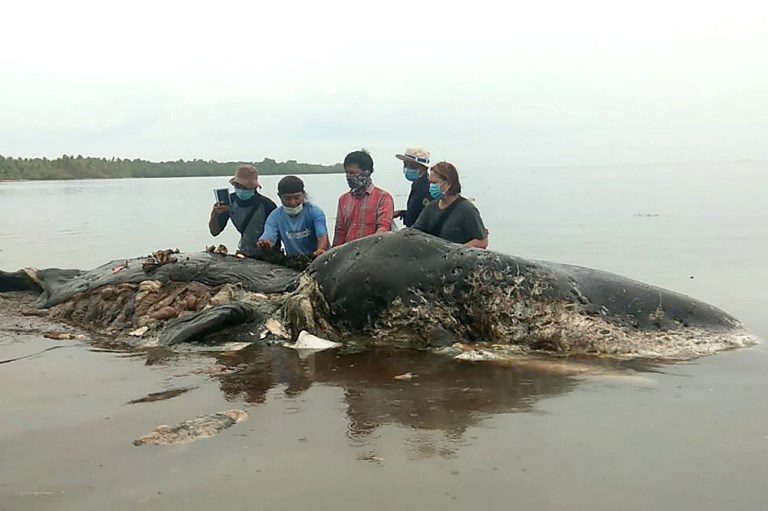SUMMARY
This is AI generated summarization, which may have errors. For context, always refer to the full article.

JAKARTA, Indonesia – A sperm whale has been found dead in Indonesia with 115 plastic cups and 25 plastic bags in its stomach, raising concern among environmentalists and throwing the spotlight on the country’s rubbish problem.
The items were part of nearly 6 kilograms (13 pounds) of plastic waste discovered in the 9.5-meter (31-foot) carcass when it washed ashore in Wakatobi National Park, in Southeast Sulawesi province, on Monday, November 19.
Other debris included flip flops and ripped tarpaulins, the head of Wakatobi tourism, La Ode Saleh Hanan, told Agence France-Presse (AFP) on Wednesday, November 21.
Conservation group WWF Indonesia said on social media its staff found 4 plastic bottles and 3.26 kilograms of raffia rope, as well as the plastic bags and cups.
The exact cause of the whale’s death is not yet known but there are signs that “plastic waste might have triggered it,” WWF Indonesia marine species conservation coordinator Dwi Suprapti told AFP.
Wakatobi district, a picturesque collection of four main islands surrounded by a marine reserve, has urged Indonesia’s central government to help tackle the problem of marine debris.
Indonesia is the world’s second biggest contributor to marine debris after China, and a colossal 1.29 million metric tons is estimated to be produced annually.
The problem has grown so bad that Indonesian officials declared a “garbage emergency” last year after a six-kilometre stretch of coast along the island of Bali was swamped with rubbish. (WATCH: What can you do about plastic pollution)
The archipelago of more than 17,000 islands has pledged to reduce marine plastic waste by 70 percent by 2025.
It plans to boost recycling services, curb the use of plastic bags, launch cleanup campaigns and raise public awareness.
But poor waste-processing infrastructure and low awareness among its 260 million inhabitants prove major obstacles. – Rappler.com
Add a comment
How does this make you feel?
There are no comments yet. Add your comment to start the conversation.